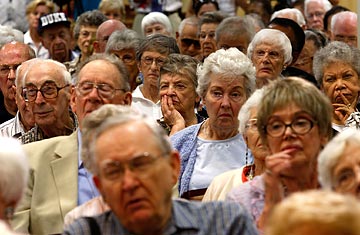
Residents listen during a health-care forum at Greenspring Retirement Community in Springfield, Va.
(2 of 2)
Certner, of AARP, says the group agrees with this sentiment, but simultaneously opposes any proposals that would cut Medicare benefits or services. He says Democratic health-reform proposals "can strengthen the Medicare system," by "finding savings through reducing inefficiencies, waste and overpayment." "If that's done correctly, there shouldn't be any harm to the program," says Certner. "But most people hearing about cuts to Medicare have no idea how the cuts are being done."
Critics might say that AARP has been out of touch with its members, while defenders could say that it is taking a more fiscally responsible view of what needs to be done to fix Medicare for the long-term. But part of the organization's current bind stems from its uniquely hybrid functions and makeup. In addition to being the voice of seniors in Washington, it also offers all Americans over the age of 50 reduced prices for gym memberships, travel and rental cars, while also selling AARP-branded insurance policies; AARP Services, a for-profit subsidiary, earned some $650 million in royalty revenue in 2008, 65% of which came from health-related offerings like insurance. (This dual advocacy/insurance brokerage role has made AARP a lightning rod for criticism over the years, especially in cases when the group lobbied for legislation that would have been a boon to its for-profit operations.) AARP, therefore, has to balance the interests of members aged 50-64 with those of members over 65. Its younger members are among the fastest growing cohorts of the uninsured and pay some of the highest premiums for insurance policies on the open market; these members would be most affected by private health-insurance reform and a public health-insurance option that could reduce costs. AARP's Medicare-eligible members, on the other hand, are focused on preserving that program's benefit levels.
To try to get its membership back in line with AARP's pro-reform stance, the group is stepping up its communication efforts. A national television advertising campaign got underway in August, 8 million pieces of direct mail related to Medicare and health reform will be sent out after Labor Day and the September issue of AARP Bulletin, which reaches some 40 million households, will include a cover story on health-care myths. The White House is also gearing up for a new message campaign aimed at seniors; it hosted a late-August conference call with advocacy groups with the power to reach seniors, including AARP, to brief them on a new eight-page talking-points memo from the Department of Health and Human Services (HHS) about how reform could help older Americans.
The HHS memo outlines reasons seniors need reform, including increasingly high out-of-pocket costs for Medicare beneficiaries to pay for drugs and medical services that could be lowered if comprehensive reform brought down the overall growth in health-care spending. The memo also points out ways that comprehensive reform could benefit seniors indirectly — uninsured Americans, who typically get less routine medical care, are sicker once they become eligible for Medicare, increasing costs for everyone in the program, for example. Unfortunately for Democrats, these nuanced points are not easily translated into sound bites, further evidence of why Democrats are currently losing the public-relations battle.
Meanwhile, Republicans have been capitalizing on the moment, suddenly presenting themselves as the defenders of a government health-care program they have spent years attacking. Republican National Committee chairman Michael Steele published an Op-Ed in the Washington Post on Aug. 24 titled "Protecting Our Seniors," and the RNC issued a press release on Aug. 28 titled "Real Solutions for Seniors."
Edward Coyle, executive director of the Alliance for Retired Americans, a union-affiliated pro-reform advocacy group that represents some 4 million seniors, says the "solo drum beat" from the opposition has so far successfully drowned out its and AARP's message. "Frankly, the other side has done a better job of raising issues that are of concern to seniors," he says. "I think the right word to use about seniors right now is confused."
